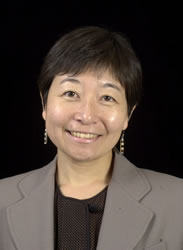|
Two
kids, two computers, and a Whole lot going on
Scott
Philip
It
was late in afternoon, and I climbed three flights of stairs
in search of room 354A in the Biological Sciences Building
at UNSW. Upon arriving, I was greeted by Dr
Kathy Takayama with a warm smile.
Her office was so filled with notes, books, and papers that
only she could navigate her way around. I removed things from
a chair and took a seat. Across the other side of the desk
were Kathy’s two young children huddled behind a laptop each.
She attended to them between the questions and answers of
this interview.
“Yesterday was more exciting,” she told me. Yesterday, Kathy
received great news; she was to host the International Conference
for the Scholarship of Teaching and Learning 2007.
Kathy's day in science included many international phone calls
to bring together academics, scholars, researchers and practitioners
from around the world concerned with how to teach students
science.
Kathy received a call back from Carl
Wieman (Nobel prize winner, Physics 2001) accepting
an invitation to be a keynote speaker for the conference.
This news was so exciting that she immediately notified all
her colleges via email.
Today, Kathy also had a meeting about the microbiology mid
session exam in the class of hers that I am taking. Unfortunately,
no clues were given away, but she did say that it would not
be an exam where one 'regurgitated learnt fact' but rather
discussed 'how to make you think.'
In high school, Kathy was interested in computer science,
maths and biology. She attended the Massachusetts Institute
of Technology (MIT) and learnt about research during her undergraduate
study.
By taking a few different science classes, she found an interest
in genetics and molecular biology. Excited by a career in
research, she then worked in the biotech industry for Biogen.
Kathy said she enjoyed it, but she went back to get her PhD
where you can "do you own thing…creatively."
Dr Kathy now teaches for the University of New South Wales,
working on various research projects, and she is very involved
in various science education endeavours.

|
|